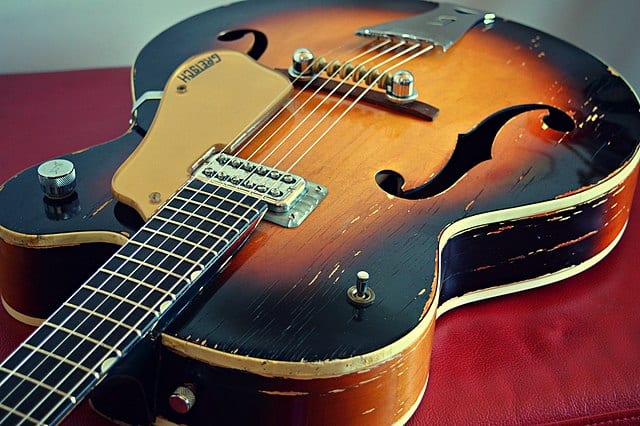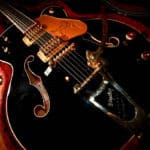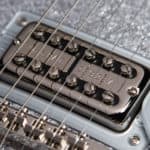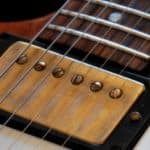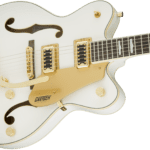Ah, Filtertrons.
A pickup so iconic that a Gretsch guitar wouldn’t sound like a Gretsch guitar without them.
It’s also hard not to imagine one of their guitars without one of these space-age-looking pickups on the body.
In short, both Filter’trons and Broad’Trons are different flavors of the same thing. While Filter’trons retain that classic twangy Gretsch chime, Broad’Trons have a slighter more present mid punch, and a bit more output. You can think of the latter as more similar to the traditional PAF sound.
Both have that mojo that makes Filtertron-style pickups unique and both are made by the company that put these pickups on the map.
As mentioned, they are as iconic as the guitars themselves, and so versatile a sound that they have found their way into country (Chet Atkins), pop (George Harrison), rockabilly (Brian Setzer), and even hard rock and metal (Malcolm Young and Richard Fortus).
Filter’Trons main features
First designed by Ray Butts in 1957, the Filtertron-style pickup was the first humbucking pickup created (but not the first patented – that honor goes to the PAF, or “Patent Applied For” pickup) to solve Chet Atkins’ problems with hum in the studio (Atkins was a noted Gretsch endorser for many years).
What makes these pickups unique from their humbucking brethren is that their design (particularly the fewer number of winds around each pickup magnet, as well as the smaller size of the two coils) makes for a pickup that has less output than a PAF-style humbucker, a fair amount of punch and more accentuated highs, while also canceling out the 60-cycle hum so prevalent with single-coil pickups.
These pickups truly offer the best of what single-coils and humbuckers have to offer.
(Before going any further, and for clarity, the term “Filtertron” will be used to designate the pickup style, while “Filter’tron” will be used to denote the specific pickup model being discussed. Cool? OK, let’s go!)
The Filter’tron pickup is Gretsch’s standard humbucker pickup and can be found in several of their guitars, as well as a number of Fender guitars as well (after Fender acquired Gretsch – I’m looking at you, Carbonita).
According to Gretsch’s website, their overall output falls just above that of the P-90 (but with the added bonus of no hum or noise), and with more clarity in the top end. Compared to the PAF-style humbucker, they do have a much lower output but make up for it in clarity compared to a mid-heavy humbucker.
Think of the tones of Chet Atkins, Brian Setzer, and Malcolm Young to give you an idea of the sound. Gretsch currently offers this particular pickup in a number of their Professional and Electromatic collection guitars and continues to be their flagship pickup.
Broad’Trons main features
Broad’tron pickups are another variety of Filtertron pickup made and offered by Gretsch.
These have the same aesthetic as the Filter’tron pickup, however, offer the output closer to that of a PAF-style humbucker, while retaining more high-end clarity and adding a bit more midrange.
So, more punch compared to the Filter’tron, but more top-end sparkle. Also, since it is a humbucker, no 60-cycle hum to contend with!
These pickups are also available in Professional and Electromatic collections (though in a much smaller number of guitars than the ones equipped with Filter’trons), as well as the Streamliner collection (Gretsch’s “budget” line of guitars, which should also be noted does not have any Filter’tron equipped guitars).
Main differences between Filter’Trons and Broad’Trons
When deciding against Filter’Trons and Broad’Trons, the biggest thing to consider is the output level.
Both pickups do feature that high-end chime that Filtertron-style pickups are known for, so there are no worries one of them is lacking in that area.
The Filter’trons may have a touch more high-end chime and a more balanced sound than the Broad’Trons. They will also have a touch more of that “Twang” that is associated with Gretsch guitars.
Broad’Trons retain most of that while having higher output than the Filter’Tron, with some added punch in the mid-range.
These will likely also drive an amp and pedals harder, so if your gear is sensitive to that sort of thing, it is something to consider.
Is it worth it to upgrade from one of these pickups to the other?
The choice to upgrade or not really depends on the amount of output you need.
These pickups undeniably have the Filtertron sound, only one is a bit hotter and mid-rangy than the other. Both would be a great upgrade if you need something that is brighter than a traditional PAF-style humbucker since it offers a bit of that single-coil mojo that PAFs don’t.
You’ll also need to consider the upgrades to the guitar if you’re thinking about swapping out a humbucker for one of these (or any) Filtertron-style pickups.
Their sizes are smaller than traditional humbuckers, and the adjustments on the pole pieces are longer.
You will need to make sure that your pick-up cavity and pickguard can accommodate these differences. If you do decide to go that route, it is recommended that you have the pickups professionally installed, just to be on the safe side.
Now, the other thing to consider is how much searching you want to do to find one of these pickups outside of purchasing the Gretsch guitar that they’re built into.
A quick search on Amazon didn’t yield many hits for Filter’Trons, though there was more luck on sites like Reverb.com, and Broad’Tron pickups are much, much harder to find, whether new or used.
Which is best for you?
If you’re craving that classic Filtertron sound, both will get you there.
- If you play pop, rock, country, rockabilly, blues, or jazz, and want something a bit brighter than a PAF, maybe start by looking at the Filter’Tron
- If you’re more on the hard and heavy side of things, or on a bit of a budget (considering the Steamliner line from Gretsch), consider the Broad’Tron pickups for their higher output and mid-range presence.
- There are also a huge number of different companies (Seymour Duncan, MojoTone, Arcane, etc. as well as probably the most famous of all, TV Jones) that make Filtertron-style pickups with a variety of voicings, outputs, etc. If the Gretsch offerings are hard to find on the new or used market, many of these will get you where you need to go, without searching long and hard.

Hello there, my name is Ramiro and I’ve been playing guitar for almost 20 years. I’m obsessed with everything gear-related and I thought it might be worth sharing it. From guitars, pedals, amps, and synths to studio gear and production tips, I hope you find what I post here useful, and I’ll try my best to keep it entertaining also.

